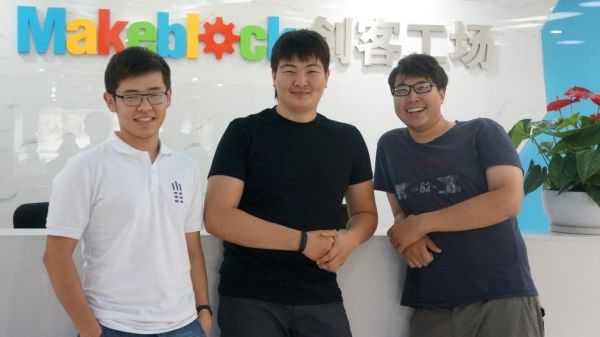Nazarbayev University students Dinsultan Absattar, Olzhas Adiyatov and Azamat Tikenov participated in a successful training at Makeblock in Shenzhen (China). As part of their internship, the young entrepreneurs participated in implementing six innovative projects.
The projects included construction of a robotic platform with a manipulator, a hexapod robot which operates on six feet and a cyborg for gyro scooter-type stabilisation. The Kazakh interns also worked on an electronic circuit for quadrotors and studied the apparatus for assembling Rubik’s Cube.
The financial side of the trip was covered by a grant from the Shakhmardan Esenov Science and Education Foundation.
“The knowledge that I have attained in China I will be able to apply in the university’s laboratory. I will continue researching on trajectory planning and motion. The internship at Makeblock helped me to understand that not even the uniqueness of the idea is that important, but an opportunity to find a way for its implementation and sales,” said Adiyatov.
Absattar noted most Chinese people know English, but not all are able to speak it.
“The linguistic issue hampered the process of technology understanding, as well as the fact that the Chinese government continues blocking all Google services and other foreign resources. However, my stay in Shenzhen will help me write a thesis and I already plan to make major changes to my final student project. After working for Makeblock, I realised what kind of professional I need to be and in what direction I should move in my career. I also was motivated to improve my English, as it significantly helped me to understand the technical documentation and manuals, as well as to survive in the Chinese environment, simplifying my travelling around the city,” he said.
Makeblock co-founder Alice Gian gave positive feedback, emphasising the professional qualifications of the Kazakh students. She also noted the interns diligently mastered advancements in innovative technologies, as they are certainly talented and quickly understand new information.
Tikenov mentioned one month is not long enough for such an internship and suggested prolonging it up to three months.
Esenov Foundation programme coordinator Ilzira Aldagarova indicated it is difficult to receive three-month visas at the Chinese Embassy, as it takes a lot of time.
“In this regard, we were forced to take a one-month visa and limit the training time. We also concluded that it is better to start negotiations on internships for 2017 right now. This measure corresponds with particularities of doing business in China and to successfully implement our plans we must take into account local mentality and traditions,” she said.
Makeblock, a robotic startup, is a design platform to create DIY (do it yourself) robots. In 2013, the team consisted of 10 people and today has more than 120 specialists. Makeblock cooperates with Arduino and Microsoft and succeeded in attracting investments of more than $150 million. The company has also established official distributors in 40 countries around the world.

